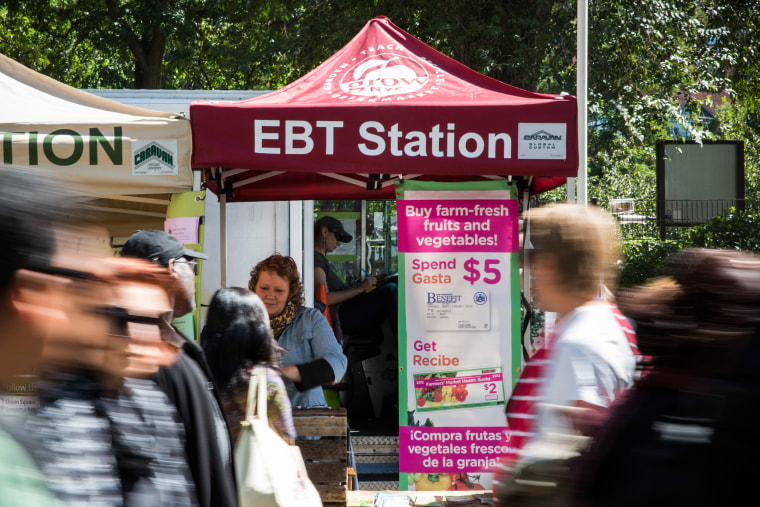The debt ceiling agreement includes an expanded work requirement provision that would create unnecessary barriers for more low-income households, with negligible savings for the federal government, anti-hunger advocates say.
Many people who participate in the Supplemental Nutrition Assistance Program, or SNAP, must comply with work requirements to get monthly funds to buy groceries. The debt limit deal, struck over the weekend between President Joe Biden and House Speaker Kevin McCarthy, R-Calif., would raise the ages of participants who need to provide proof of work for SNAP from 18-49 to 18-54.
SNAP, a wide-reaching public assistance program formerly known as food stamps, requires so-called able-bodied adults who don’t have dependents to work or participate in approved job training programs for at least 80 hours a month to get more than three months of benefits over three years.
While Republicans say the expanded work requirements would help people get jobs, anti-hunger advocates argue that requirements should be eliminated altogether, citing research that indicates they don’t have a measurable effect on participants’ employment.
“It’s not doing anything to help them, to help the economy. It’s just a punitive way to take food away from people,” said Ellen Vollinger, the SNAP director for the Food Research & Action Center, an anti-hunger group.
She added that the requirements could pose particularly big challenges in the labor market for the new age group.
“If you’re 50 to 54, you may be dealing with age discrimination,” she said. “You may be dealing with a career where you worked for many, many years within a certain sector, and then all of a sudden things change for you and you’ve got to get a new skill set.”
People with dependents, including children and older adults, and those with documented disabilities have been exempt from work requirements and would continue to be under the tentative plan, which still must pass Congress.
In what the Biden administration has touted as a victory, the new proposal also would exempt veterans, homeless people and youths aging out of foster care from SNAP work requirements.
Activists say it wouldn’t even out. Lisa Davis, a senior vice president of the No Kid Hungry campaign at Share Our Strength, a nonprofit organization working to end hunger and poverty, said the proposal “will save the U.S. very little money.”
“We shouldn’t be playing politics with programs that help Americans meet their basic needs,” she said in a statement.
Parker Gilkesson, a senior policy analyst with the Center for Law and Social Policy’s Income and Work Supports team, said three months was an “arbitrary” time frame to allow participants to look for work before their benefits are cut off.
“It doesn’t consider the realities of today’s labor market,” she said. “Food plays an integral role in people being able to find work. You can’t find work when you’re hungry.”
‘We’re very concerned’
Conservative groups have long pushed for slashing SNAP enrollment and have recently racked up a streak of successes across state legislatures. Many include tighter work requirements.
In April, Kansas legislators voted largely along party lines to override Gov. Laura Kelly’s veto of a work-requirement bill that goes even further than what debt-limit negotiators landed on. It extends the age limit of those considered to be able-bodied adults without dependents from 18-49 to 18-59, which would require most SNAP participants ages 50-59 to work at least 30 hours per week or attend mandatory job training.
The Republican supermajority in the Kansas Statehouse enacted the 30-hour work requirement last year. Since the measure took effect, more than 1,000 able-bodied adults without dependents have stopped receiving food assistance, the Kansas Department for Children and Families recently estimated.
“We’re very concerned in the charitable sector that those people are not going to get gainful employment,” said Karen Siebert, an advocacy and public policy adviser for Harvesters, a regional food assistance network based in Kansas City, Missouri. “They’re going to come to the food pantries for help, and we’re struggling to keep up with the need as it is.”
More than 42.5 million people nationwide received SNAP benefits in February, the latest data available from the Agriculture Department shows. Experts said it’s not yet clear how many people could be affected by the expanded work requirement; the White House has said the total number of participants wouldn’t be significantly different.
Grocery prices are still high, and low-income households continue to recover from other losses, such as the end of pandemic-era emergency SNAP allotments that provided an extra cushion.
“Why would we balance our budget on the backs of super, super poor people?”
— Katherine Hempstead, senior policy adviser at the Robert Wood Johnson Foundation
“It’s inevitable that this will cause hardship,” said Katherine Hempstead, a senior policy adviser at the Robert Wood Johnson Foundation, a philanthropic organization. “Food insecurity is a problem, and food is really expensive.”
She suggested the federal government focus on other areas of the labor market, such as increasing the minimum wage, to reduce the number of people who need assistance.
“If we’re trying to save federal spending, there’s a lot of places to look, I’m sure. But I wouldn’t look at SNAP,” Hempstead said. “Why would we balance our budget on the backs of super, super poor people?”


